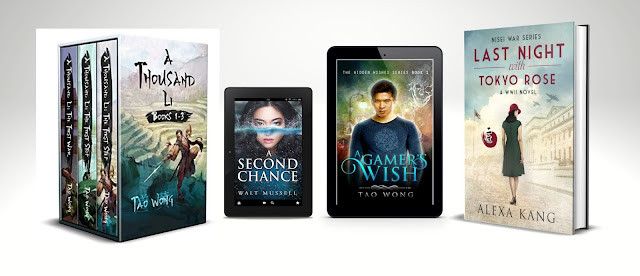
Happy Chinese New Year! I’m indie WWII historical fiction author Alexa Kang, and it is my honor to begin the Year of the Ox as the Asian Books Blog's new Indie Spotlight Editor. You might have read my previous guest posts here and here. Going forward, I hope to bring you your next great reads.
Indie publishing has come a long way since Amazon opened the door in 2010 for authors to bring their stories directly to readers. The market of indie-publishing has matured since then. While writers can now release their books through online retailers, that alone is not enough for the books to reach and gain an audience. Successful indie writers today not only must offer quality books that can match and compete with traditionally published books, they must also be savvy in branding, marketing, and e-commerce.
My foray into indie writing was serendipitous. It began in 2016. I never aspired to be a fiction author. I was writing fan fiction for fun within the global fandom of the Japanese manga series, Candy Candy. My fanfic was very well-received, and was fan-translated into multiple languages. After my fanfic, I started writing a spin-off story from Candy Candy, with characters entirely of my own creation who I imagined to be children of the cast of Candy Candy. That spin-off story would ultimately become my debut WWII series Rose of Anzio.
I wrote Rose of Anzio over the course of a year. Each week, I would post a new chapter on a Candy Candy fan forum. I still remember fondly the days when Candy Candy fans who followed my story would eagerly devour each new chapter I uploaded. I realized then that Rose of Anzio had the potential to be read by a much wider audience. I started looking into publication options. Immediately, I learned two things. First, by posting the chapters on a public forum online, Rose of Anzio was considered already published, and no traditional publisher would accept a manuscript that had lost its “first publishing right”. Secondly, I can publish the story myself on Amazon.
Choosing to publish the story myself was thus a no-brainer. I had another career and wasn't aspiring to be a writer; endorsement from traditional publishers and literary prizes were far from my thoughts. My only wish was to get my story to readers, because it was fun!
I set about to learn all the ins and outs of publishing books on Amazon. By then, the indie writing market was already changing into a sophisticated industry. It was overwhelming to learn about cover design, formatting, promotion, sales and marketing strategies, and gaining readers. Luckily, the indie-writing community is very supportive. Experienced authors are forthcoming in sharing information with those who are just starting out. One consistent piece of advice they gave was that our books must be professionally produced. If not, the books will languish and never attract readers.
Following their advice, I found an editor, proofreaders, and a cover artist. I also retained a fellow British author to review my British-born female main character's dialogues to make sure she spoke accurate Queen’s English (I’m an American writer myself). My story had numerous battle scenes. I went online in search of expert advice. A military historian generously offered to be my consultant and helped me create and reviewed my battle scenes. Before my books went to print, I retained a second editor, a U.S. infantry veteran, to review my military and battle scenes to make sure the characters' actions, behaviors, dialogues, and the way the battles were written, were authentic and believable.
Next, I devised a marketing plan. I implemented strategies I learned from the indie-pub community to build momentum for my book release, and to build and retain a fan base. I also had a bit of luck. My Candy Candy fanfic readers, who had been reading Rose of Anzio chapters online when I was writing the story, were eagerly waiting to have the print version in their hands. When the first book in the series came out, they not only bought copies, thus giving my book an initial boost, but also left glowing reviews of why they liked the book.
In retrospect, releasing my books on my own was the best thing I could have done. It turns out, many of my readers had lived through the war era. I had no idea this was the case when I first published. I assumed most of my readers would be in my own age group. The first time I received an email from a reader, it was from Marci, a lady who wanted to know when the second book in the Rose of Anzio series would be released. Marci said she and her best friend worked in Chicago in 1940. Rose of Anzio-Book One was set in 1940 Chicago. She told me she bought the eBook for herself, and a print copy for her best friend.
My jaws dropped when I read Marci's email. I had to read it several times to confirm I was reading it right. Did she say she worked in Chicago in 1940? My book was released in 2016. I was shocked to learn that my novel resonated with readers who knew life in 1940s Chicago first-hand. I learned then that all my hard work and research had paid off.
Over time, I discovered that my books were bringing back memories to a generation of readers nostalgic for a world they once knew. In a Facebook group for WWII fiction readers and writers, a reader, Bonnie, once posted and recommended Rose of Anzio. I never interacted with Bonnie except to thank her for a post recommending my books to the group. When Bonnie finished reading my novel Eternal Flame, a Rose of Anzio spin-off, she left a one-sentence, positive review on Amazon. Three days later, a fellow group member told us Bonnie had passed away. I did not know until then that Bonnie had been terminally ill. The news filled me with emotions as I realized she had spent her last hours reading my book. She even left me a gift of a review. I could not tell her how grateful I was. I could only hope that my story gave her a little bit of comfort before she left.
This would not be the last time I had to bid farewell to a reader. Another reader who reached out to me was Betty Martin. Ms. Martin lived through the war era, and her husband was part of the Flying Tigers, the U.S. air force unit that fought in West China. Ms. Martin and kept in touch for two years, until her friend alerted me to her passing and told me Betty had been waiting for my next release. I was very saddened to hear the news, and I dedicated my next book to her.
When I think of my readers from the Greatest Generation, I’m glad that I had inadvertently fallen into self-publishing. If I had taken the traditional publishing route, I might have missed the chance to bring my stories with these readers. Even if an agent and a publisher had picked up my books, it would take on average two years for each book to be published. If I am able to give a few hours of comfort and escape to readers like Marci, Bonnie, and Betty, that would be reason enough for me to continue this course.
Being an indie author also gives me the freedom to write books without a proven sales record in the market. Currently, the WWII fiction genre is sorely lacking in novels with Asian main characters, and novels set in the Pacific. Traditional publishers are often averse to taking on books without data assuring sales. Unconstrained by such concerns, I wrote my series, Shanghai Story, to chronicle China's descent into WWII. The story features a Chinese male character. Novels with an Asian male lead is still a rarity today. I took the risk that traditional publishers are less willing to take, and am happy to discover that there is indeed a market demand.

For my current series, I am continuing to walk the path less traveled. In the WWII fiction genre, there are woefully few novels about Nisei (second-generation Japanese-Americans). Of the ones currently sold, the focus is on internment camps. I want to explore the Nisei experience beyond the confine of the camps. My new release, Last Night with Tokyo Rose, follows the journey of Tom Sakai, a Nisei growing up in an America increasingly hostile to those of Japanese ancestry. When he is stranded in Manila after Pearl Harbor, he would have to navigate the treacherous terrain of a world in which Japan and America are at war, and decide where his allegiance lies.
In the coming year, I plan to introduce to you books by some of the best indie authors in today’s publishing world. We will learn the interesting stories of how they came onto the path of indie-publishing, and their works which you would not want to miss.
I invite you all to visit my website at https://alexakang.com. You can also sign up for my newsletter at https://alexakang.com/newsletter



















